Suchergebnisse
Workshop "Biorefineries on their pathway towards net-zero emissions"
7. November 2023
Online
The IEA IETS Task 11 workshop on "Biorefineries on their pathway towards net-zero emissions" collects case studies and methodologies from industry and research on how net-zero emissions can be achieved in biorefineries.
BIPV as Architectural Tool
15. June 2018
TU Wien, Getreidemarkt 9, 1060 Wien, AT
Within the international meeting of the IEA PVPS Task 15 "Enabling Framework for the Acceleration of Building integrated Photovoltaics (BIPV)", a workshop on "BIPV as Architectural Tool" is organized providing the opportunity to meet local PV-Architects and BIPV stakeholders.
IEA TCP Fluidized Bed Conversion (FBC). Working period 2013-2016
The Technology Collaboration Programme includes the collaboration, the exchange of relevant information and networking in the area of fluidized bed conversion of fuels applied for clean energy production.
M-DAB2: Material intensity of inner development - resource assessment and localization of urban development potentials
For the first time, the material intensity of inner development (in terms of material quantities) for different design variants was considered in the evaluation of inner development potentials. A set of methods for the holistic evaluation of potential areas and different development variants and scenarios for resource-saving inner development was created.
Renewables 2010 Global Status Report
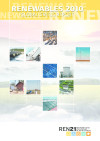
Englisch, 80 Seiten
Downloads zur Publikation
Cascading Of Renewables
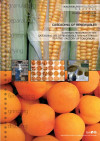
Austrian Research on the Cascading Use of Renewable Raw Materials for the "Factory of Tomorrow"
Forschungsforum
1/2005
Herausgeber: BMVIT
Englisch, 6 Seiten
Downloads zur Publikation
The Korean Energy Strategy Project (Minchener, 04-2008)

Englisch
Solar Heating and Cooling in Austria
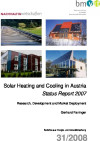
Status Report 2007
Research, Development and Market Deployment
Schriftenreihe
31/2008
Gerhard Faninger
Herausgeber: BMVIT
Englisch, 42 Seiten
Downloads zur Publikation
Whitepaper "Smart Grid Cyber Security"
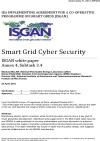
M. Miller, D. Haglund, Gunhee Lee
Herausgeber: International Smart Grid Action Network (ISGAN) Annex 4, Subtask 3.4
Englisch, 16 Seiten
Downloads zur Publikation
Systemic renovation in the social housingsector

This project treats a global renovation of a residential estate built in the 1960s in the context of council housing in a laggard region. The point is to optimise with a systemic approach in a interdisciplinary team all partitions which include habitation.
Workshop: Life in the Fast Lane - Evolving Paradigms for Mobility and Transportation Systems of the Future
26. - 27. October 2016
Washington, DC
A Workshop to Determine Research & Development Needs and Supporting Policies.
IEA SHC Conference and ISES Solar World Congress 2017
29. October - 2. November 2017
Jumeirah Hotel at Etihad Towers, Abu Dhabi, United Arab Emirates (UAE)
The International Solar Energy Society, ISES, and the International Energy Agency’s Solar Heating and Cooling Programme, IEA SHC, are very pleased to announce that their next international conferences, the ISES Solar World Congress 2017 (SWC 2017) and the Solar Heating and Cooling for Buildings and Industry Conference (SHC 2017) will be held together.
IEA FBC Implementing Agreement Fluidized Bed Conversion (working period 2017 - 2020)
The technology programme includes the collaboration, the exchange of relevant information and networking in the area of fluidized bed conversion of fuels applied for clean energy production.
5th European Bioplastics Conference
1. - 2. December 2010
Hilton
Düsseldorf, DE
Latest technological and market developments
Making electricity networks flexible
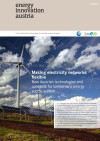
New Austrian technologies and concepts for tomorrow's energy supply system
energy innovation austria
2/2014
Herausgeber: BMVIT and Klima- und Energiefonds
Englisch, 8 Seiten
Downloads zur Publikation
IEA FBC Technology Collaboration Programme Fluidized Bed Conversion (Working Period 2024-2026): "IEA Green FBC"
The goal is to further expand and deepen the international cooperation of IEA fluidized bed technology both globally and nationally with regards to green technologies and to continue the successful course towards a most climate-friendly, sustainable and low-pollutant heat and power production using fluidized bed technology. All stakeholders are included and work closely together on a national and global level.
Technology Roadmap: Energystorage (2014)
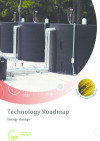
Herausgeber: International Energy Agency
Englisch, 64 Seiten
Downloads zur Publikation
Energy R&D - Public Expenditure in Austria 2012

Membership of the International Energy Agency (IEA) obligates Austria to report on an annual basis all publicly financed energy research and development projects. This survey fulfils not only international requirements but also shows the importance of energy research in Austria and helps to set and test policy goals as well as to recognize respective trends at an early stage.
Schriftenreihe
38/2013
Englisch
Bioenergy: Counting on Incentives (2010)

Response to the paper by D. Searchinger et. al., Letters to Science. 327 (2010), 1199 - 1200.
Pingoud K., Cowie A., Bird N., Gustavsson L., Rüter S., Sathre R., Soimakallio S., Türk A., Woess-Gallasch S.
Englisch
